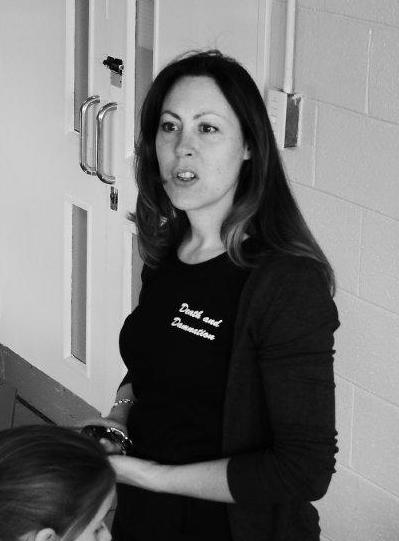 Back in the day when my drama school was in full swing, I ran classes concurrently so that parents could drop siblings together at the same time, rather than dropping and picking up all afternoon. Often times, we’d combine two classes for warm up games, giving the children the opportunity to get to know both teachers, which was handy if either of us needed cover. My right-hand girl at the time – Angela, would occasionally take the opportunity to nip outside for a quick vape. She would convey this intention to me through a series of mimed actions (we were drama teachers after all), and over time the mime shortened simply to her ‘dropping’ a magical puff of smoke and stepping slowly away backwards. I would nod my comprehension: she was about to disappear in and for the purpose of said puff of smoke. As with all my teachers, we had a symbiotic relationship: they could read my mind (usually along the lines of: “How do I open this Facebook yoke?”); during live performances, we communicated clearly from backstage right to backstage left through a series of exaggerated facial expressions. Working together gave my young teachers the chance to learn from me, and I gained the joy of just being with them, for teaching during the early years with only children for company, could be a lonely affair. I considered it a bonus to be working with young people, teenagers from youth theatre to young adults who just wanted to stay on in the school while they were in college. It meant I could keep my finger on the pulse of whatever was cool. They were young. I was older. And being older was considered a good thing. I was respected. I mentored. I understood memes. I learned how to dab. Downtime was fun but so were the classes. My youth theatre group adored improvisational drama and they were positively heroic in passing their enthusiasm onto the younger students. I loved training by example – above all that the children should feel they’d found their tribe; let them know we actually like them, cheer them for their traits and quirks, their particular talents and abilities. They in turn would pass on this encouragement and kindness amongst each other. I could look around me, at my students and at my teachers, and bask in the energy emitting around the space, the buzz in the room. It felt good to have created all this from one single student in my mother’s dining room back in 1992. Being the oldest person in the room was an honour and nothing to be ashamed of. And then I turned fifty. It didn’t happen on the stroke of midnight exactly, but it crept up on me while I was minding my own business, going about my life exactly as I had before, excepting the gathered knowledge and wisdom that comes with the years. It was there, this skulking thing, when I updated my LinkedIn profile – ‘You might want me on your team’ I suggested, thinking what a fine thing it would be, offering insights only an older woman knows. It was there as my enthusiasm began to wane, applying for yet another job where I wouldn’t be granted an interview, where I might not even get a reply. It was more visible than me, this dreadful thing. One day, I learned its name: they call it Ageism and it makes me disappear. In two short years I went from founding a start-up business to being shunned by them. I’m a self-assured person, so it took a while for me to realise they weren’t interested in my resume: they had the measure of me by the time they read ‘born in 1967’. I think back to those days teaching people to be confident, of how the gaps in our ages was an advantage, how there was everything to be gained by us all, young and old. Like Angela, magically disappearing into a puff of imagined smoke, I had begun to slowly back away from the idea that anyone might employ me. Before I fully faded into oblivion though, I applied to a local private hospital, and lo and behold, they took me on. For the past year I’ve been working as a clerk on a ward, and while I often yearn for my former life as a creative and a business owner, it’s hard to beat a regular salary. (Imagine if I could have it all though!) Meanwhile, this employer has saved me from disappearing entirely. Recently, one of my colleagues, a member of the housekeeping team, told me she has begun to wear a brace to hold her shoulders back. I took her aside and showed her some exercises she could do, but it occurred to me that slouching her shoulders began in her head, and so I told her to keep her chin up; when she walks onto the ward, as those automatic doors open before her, she should walk, shoulders back, into her space full of confidence, faking it if she has to. It occurs to me I should do the same, walking forward, not backward, for the space around me is full of potential still; magical puffs of smoke in which anything might happen. (Next blog: What Nurses Really Want!)
0 Comments
Leave a Reply. |
AuthorGirl's got to write. Mostly keeping you updated on the book and course, sometimes a random thought, play or story... Archives
February 2024
Categories |

 RSS Feed
RSS Feed
